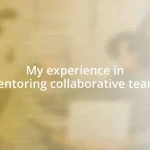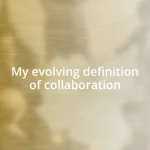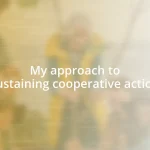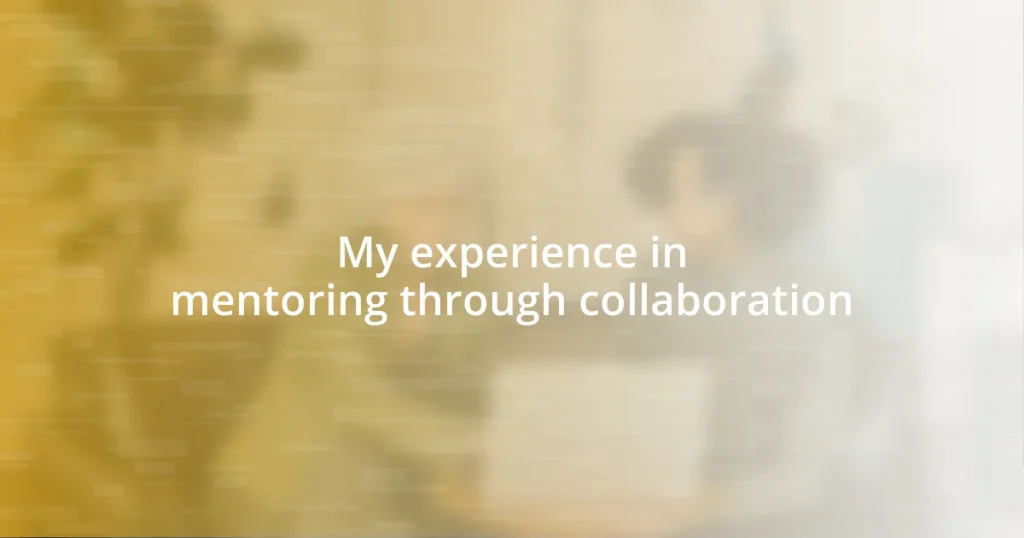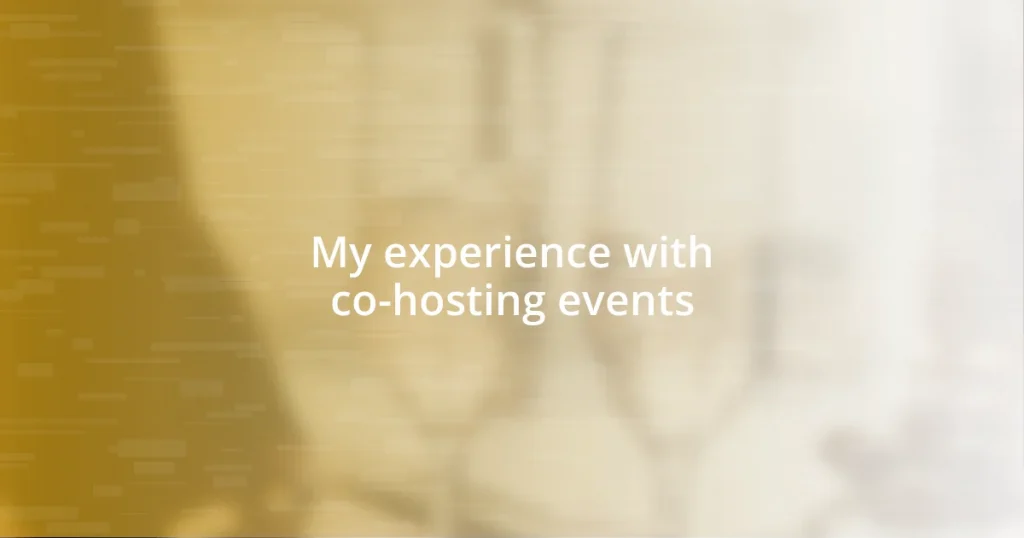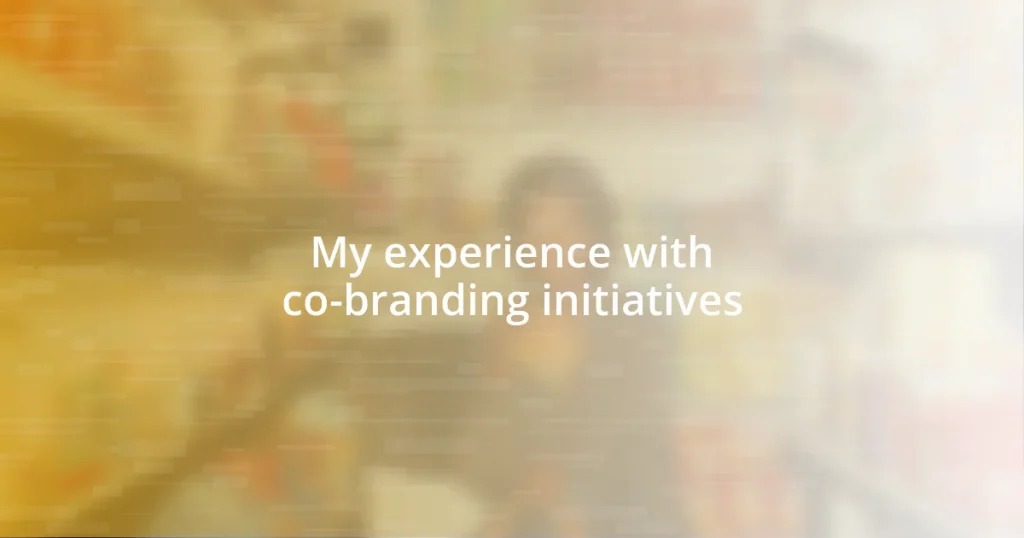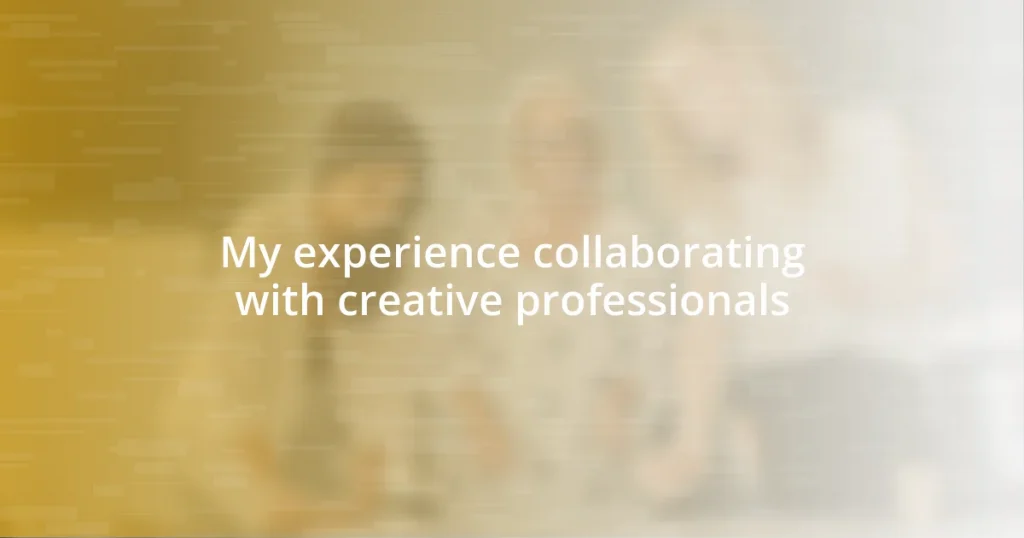Key takeaways:
- Mentoring is a reciprocal process that thrives on open communication, shared goals, and emotional support, fostering growth for both mentor and mentee.
- Setting clear and adaptable goals enhances the mentoring experience, allowing for focused development and alignment with the mentee’s genuine interests.
- Celebrating small victories and cultivating a supportive environment strengthens the mentoring relationship, empowering mentees to build confidence and creativity.
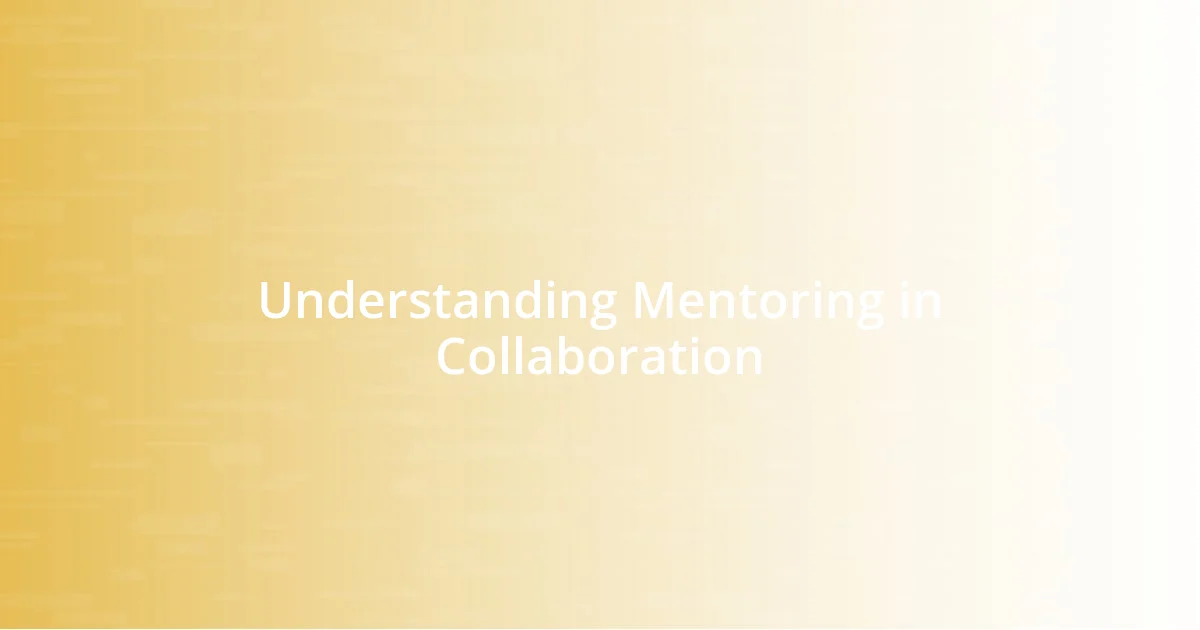
Understanding Mentoring in Collaboration
Mentoring in collaboration is a dynamic relationship that thrives on shared experiences and open communication. I remember mentoring a young professional who was overwhelmed by the demands of her new job. In our discussions, we didn’t just tackle her projects; we explored her feelings of doubt and frustration, which made our collaboration invaluable. Isn’t it powerful when we can create a space where vulnerability can lead to growth?
There’s something incredibly fulfilling about seeing a mentee light up when they grasp a challenging concept. During one particularly intense late-night brainstorming session, my mentee shared an innovative idea that not only surprised me but also ignited his confidence. This experience made me realize that mentoring is less about imparting knowledge and more about fostering an environment where creativity can flourish. What if we all approached mentoring as a two-way street, where both parties learn and evolve together?
Effective mentoring requires a willingness to listen and adapt. I once worked with a mentee who struggled with communication skills. Instead of directing her to simply improve, we collaborated to identify her strengths and interests, slowly guiding her towards finding her voice. This reciprocity cultivated a deeper understanding between us and made the mentoring process richer. How often do we stop to consider the emotions and perspectives of our mentees in our mentoring journeys?
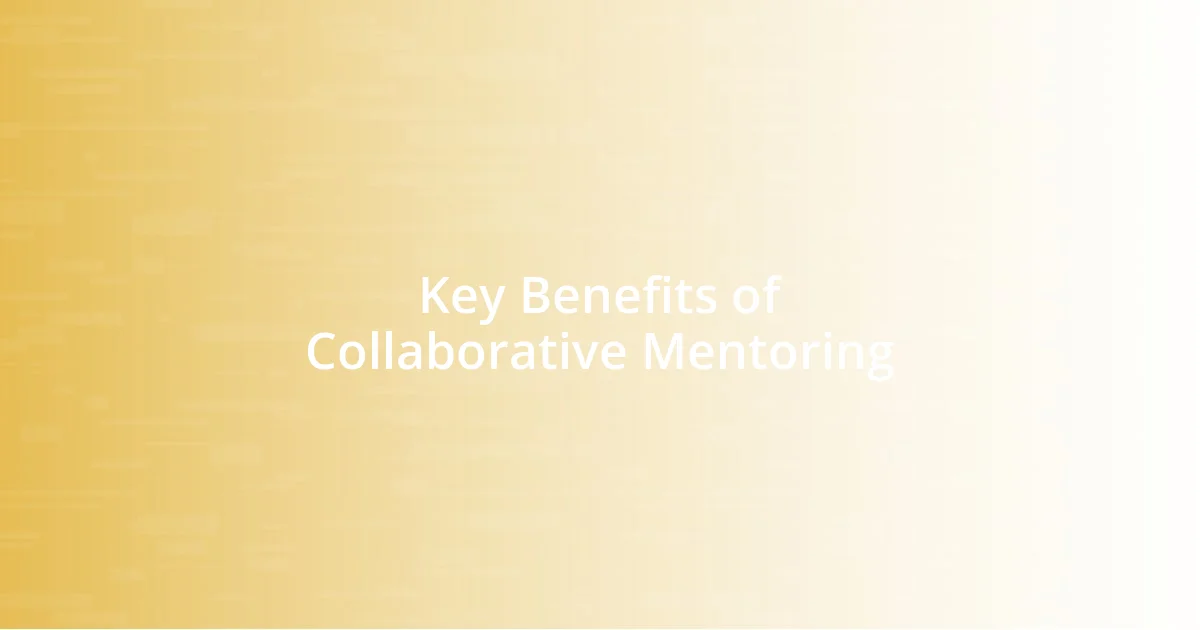
Key Benefits of Collaborative Mentoring
Collaborative mentoring brings a unique set of benefits that can transform relationships and outcomes. One key advantage is the fostering of mutual trust and respect. I recall a situation where I was paired with a mentee who was initially hesitant to share his ideas. Through consistent dialogue, we built a rapport that allowed him to express his thoughts freely, leading not only to his personal growth but also enriching my own perspectives. I feel that this kind of shared foundation creates a safe space where both mentor and mentee can thrive.
Here are some of the key benefits I’ve observed in collaborative mentoring:
- Enhanced Learning: Both parties gain insights from one another, enriching their understanding and skills.
- Increased Creativity: A collaborative environment encourages brainstorming and innovative thinking, leading to unique solutions.
- Emotional Support: Sharing challenges fosters empathy, creating a bond that helps both individuals navigate professional hurdles together.
- Networking Opportunities: Mentors and mentees can expand their professional networks, opening doors to new opportunities.
- Skill Development: Both mentor and mentee can work on their skills together, leading to personal and professional growth for both.
Every mentoring journey is an opportunity for reciprocal learning, and I find that the more I invest in my mentees, the more they inspire me to grow.
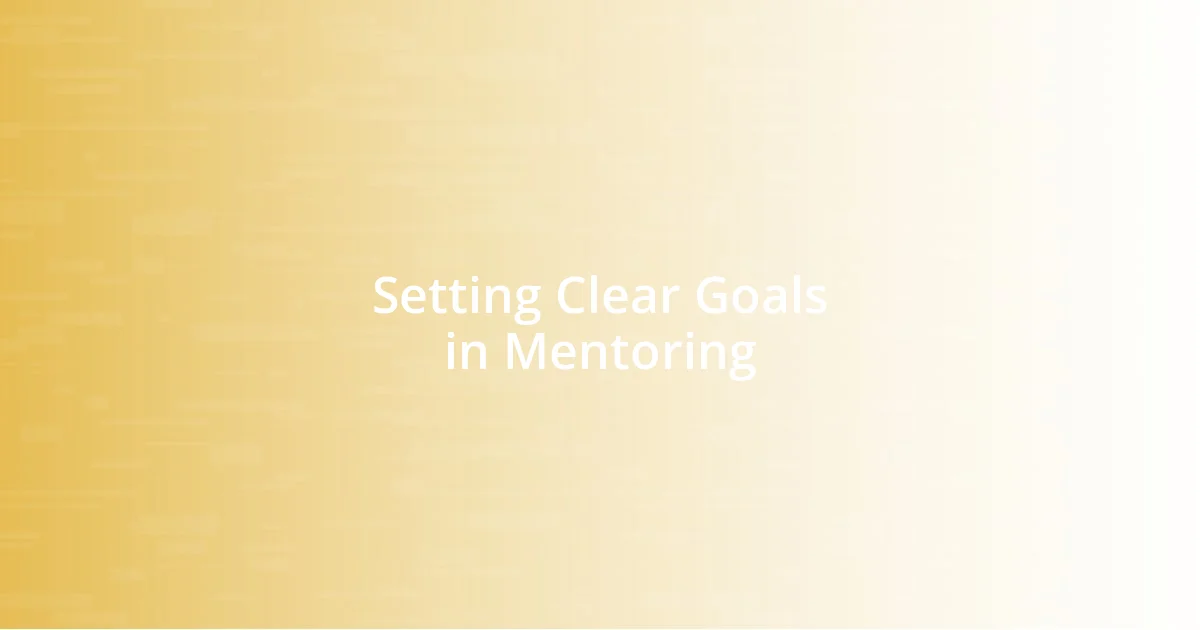
Setting Clear Goals in Mentoring
Setting clear goals in mentoring is essential for fostering a productive relationship. I remember a particularly enlightening experience when I established specific objectives with one of my mentees. We agreed on three primary goals: improving her public speaking skills, enhancing her networking abilities, and building a personal branding strategy. This clarity not only provided a roadmap for our sessions but also motivated her to embrace challenges head-on. Have you ever noticed how having a target can transform your focus?
Another key aspect is the flexibility to adapt these goals as the mentoring relationship evolves. I once guided a mentee who initially wanted to work on leadership development; however, as reflections surfaced in our discussions, we found her passion lay in project management. By reassessing and reshaping our goals, we redirected our sessions to align more closely with her genuine interests. Isn’t it fascinating how a small shift can lead to a more meaningful experience?
To effectively set clear goals in mentoring, both the mentor and mentee need to engage in open dialogues. I find that routine check-ins help ensure that these goals remain relevant and aspirational. It’s like navigating a journey together; adjusting course based on evolving landscapes fosters deeper trust and understanding. How often do you revisit your mentoring goals to ensure they reflect your current aspirations?
| Goal Type | Importance |
|---|---|
| Skill Development | Fosters continuous improvement and personal growth for both parties. |
| Networking | Expands professional connections and opens new opportunities. |
| Motivation | Provides clear targets that inspire commitment to the mentoring process. |
| Feedback | Encourages constructive conversations about progress and necessary adjustments. |
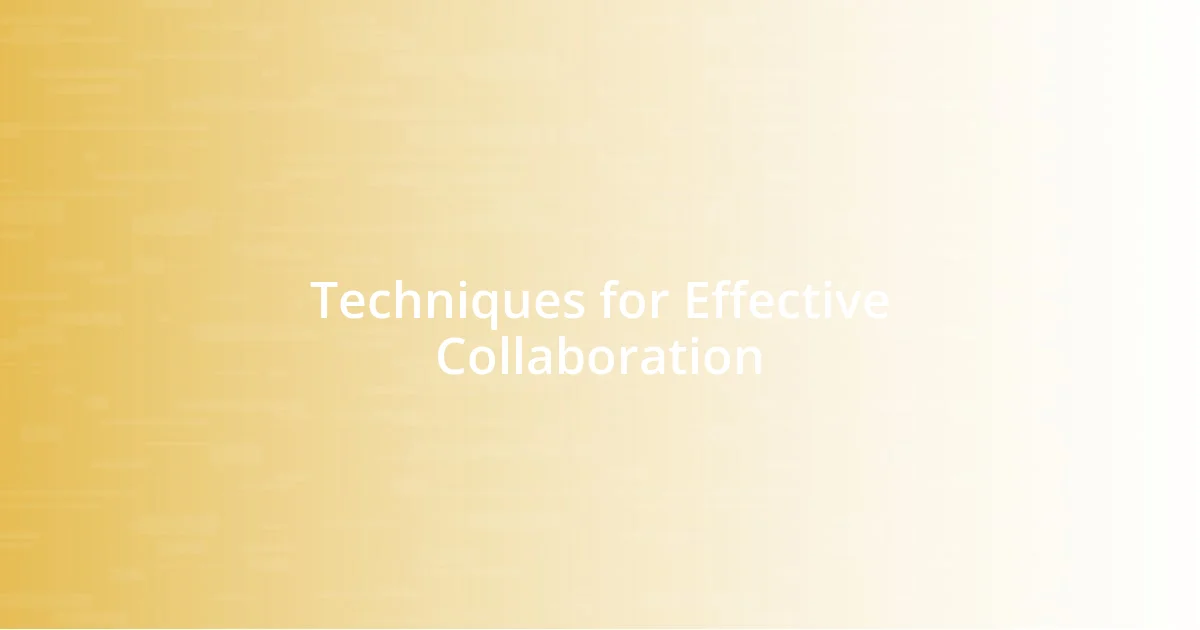
Techniques for Effective Collaboration
One technique that I find invaluable for effective collaboration is active listening. I once encountered a mentee who struggled to articulate her thoughts during discussions. By consciously practicing active listening—nodding, summarizing her points, and asking follow-up questions—I noticed a remarkable shift in her confidence. This approach not only empowered her to share her ideas more freely but also deepened our connection. Have you ever realized how just lending an ear can spark creativity and inspire trust?
Another aspect that enhances collaboration is establishing common ground. In my experience, when I make an effort to learn about my mentee’s values and interests, it builds a solid foundation for joint efforts. For instance, I partnered with a mentee whose passion for sustainability matched my desire to support environmentally friendly initiatives. Together, we created a project that not only met her goals but also aligned with my values. Isn’t it amazing how shared interests can create a vibrant synergy?
Lastly, fostering an environment that embraces feedback is crucial. When I initially started mentoring, I was hesitant to give too much critical feedback, fearing it might alienate my mentee. One day, however, I decided to openly discuss challenges we faced rather than brush them under the rug. This honesty led to a breakthrough for both of us. We learned to see feedback as a tool for growth rather than a critique of our abilities. How do you approach feedback in your own mentoring experiences? Sharing openly cultivates a culture of improvement and trust, creating an enriching collaborative atmosphere.
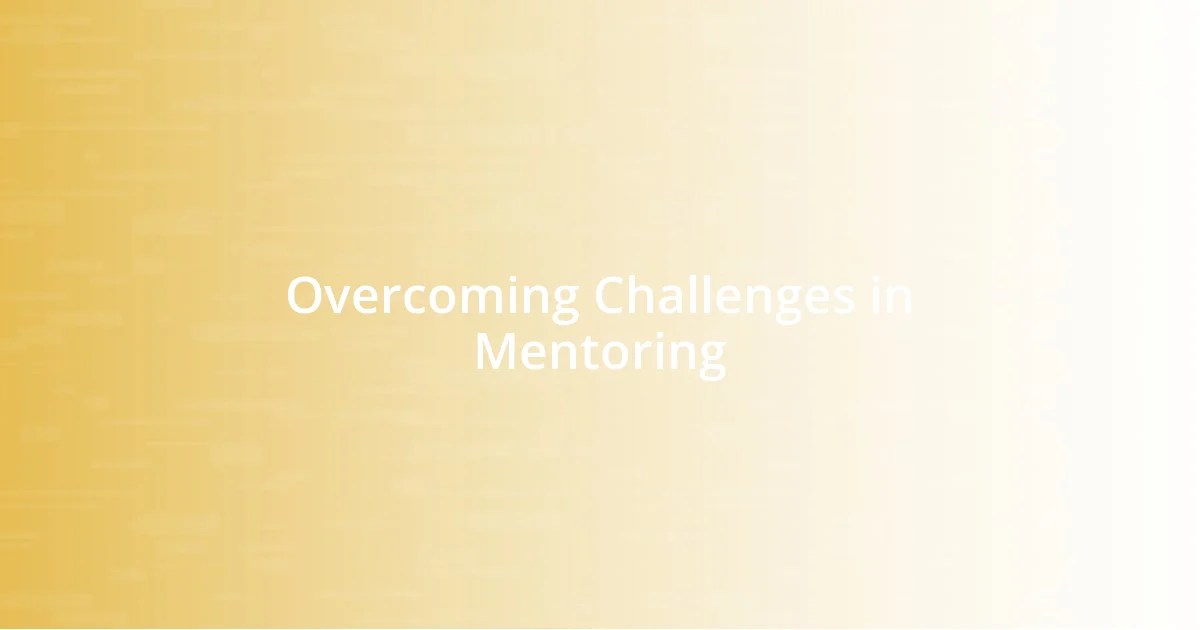
Overcoming Challenges in Mentoring
In my mentoring journey, I’ve faced various challenges that often felt daunting at first. One time, I was paired with a mentee who had significant anxiety about sharing her ideas in group settings. It took some time, but I learned that creating a safe space for her to express her thoughts one-on-one built her confidence. Have you ever tried breaking down barriers by simply chatting casually before diving into serious topics?
Communication hurdles can also pop up unexpectedly. I recall a mentoring relationship where we struggled to find the right approach to feedback. I found myself tiptoeing around her feelings, fearing that too direct feedback might discourage her. It wasn’t until I started framing my feedback with empathy—like starting with positive observations and then discussing areas of improvement—that we could navigate challenges more effectively. How do you usually balance honesty with kindness when offering feedback?
Additionally, I’ve discovered that patience is key in overcoming obstacles. There was a period when my mentee hit a plateau in her progress. Frustration grew on both sides, but I took a step back and reminded her of the small wins we had achieved together. Reflecting on our journey helped us regain momentum and reaffirmed our commitment. Isn’t it amazing how looking back can provide valuable perspective during tough times?
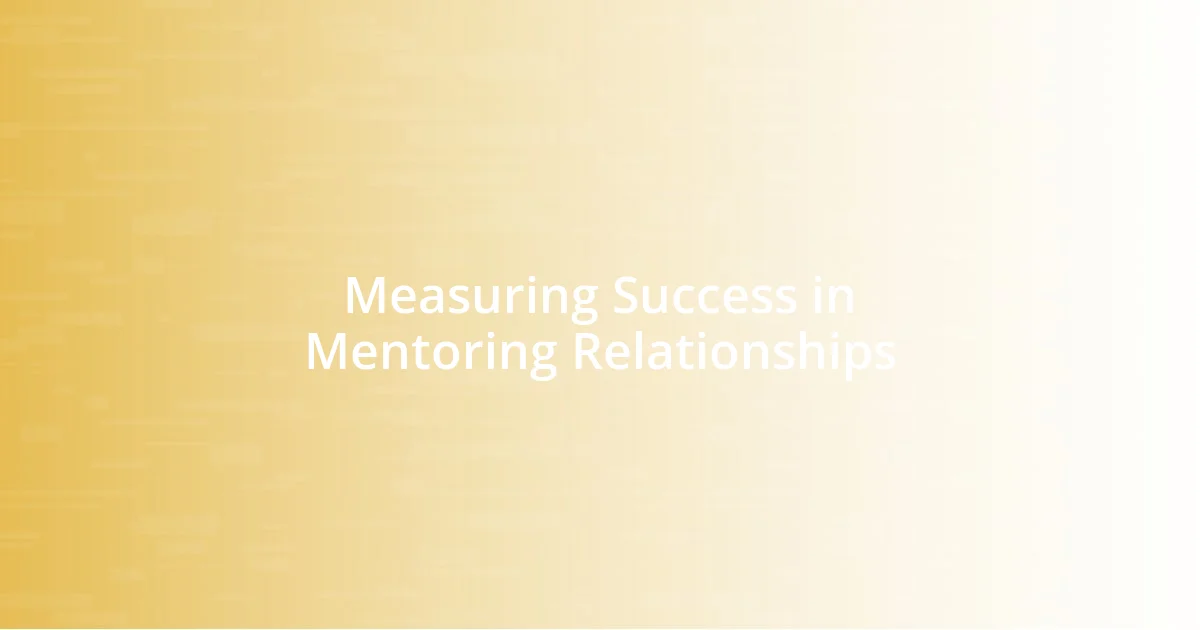
Measuring Success in Mentoring Relationships
When I think about measuring success in mentoring relationships, one of the most telling indicators is the growth visible in my mentee’s self-confidence. I recall working with a young professional who initially hesitated to voice her opinions in meetings. As we navigated the mentoring process, I noticed her beginning to engage more openly in discussions. That shift, where she boldly shared her insights, felt like a success worth celebrating. Do you have moments when you can almost see someone blossom before your eyes?
Another important metric I consider is the quality of the goals set during our time together. I once had a mentee who initially aimed for a promotion but, through our discussions, identified a deeper desire to develop her leadership skills. By redefining her objectives to focus on personal growth rather than just a title, she found renewed passion in her journey. Isn’t it fascinating how clarifying goals can lead to more meaningful achievements?
Moreover, I’ve found that the feedback we give and receive plays a critical role in determining our mentoring success. Regular check-ins to discuss challenges, triumphs, and lessons learned help foster a stronger bond. I remember a mentee who expressed her appreciation for my candid input during our sessions; it not only strengthened our relationship but also led her to make significant strides in her work. Have you noticed how valuing feedback can create a rich, collaborative dialogue?
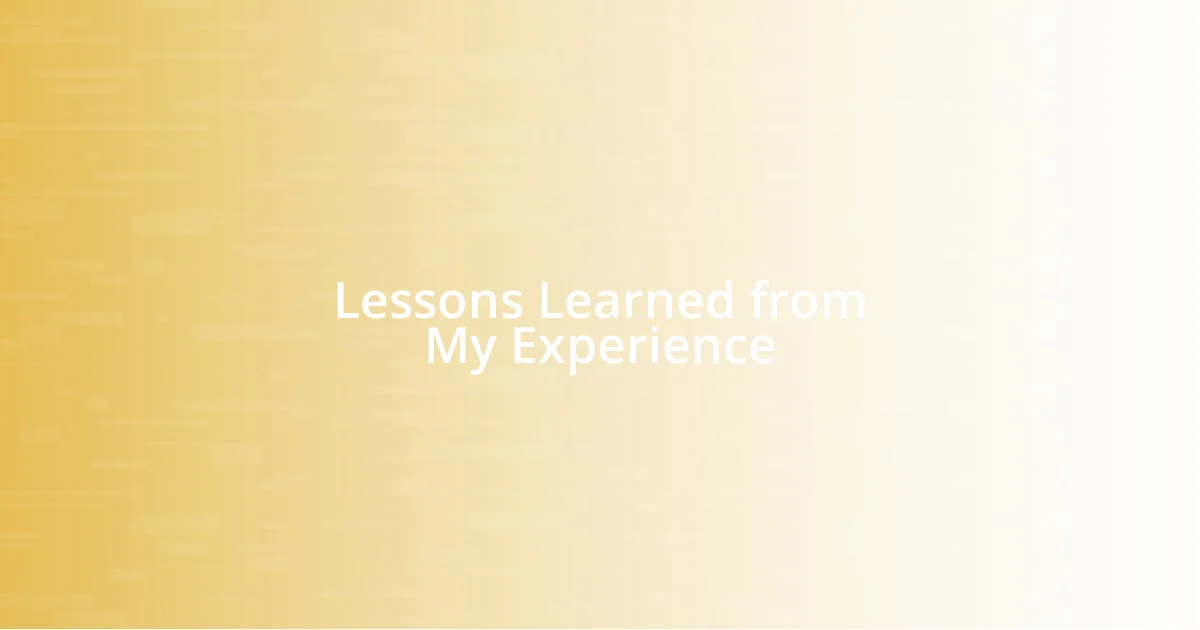
Lessons Learned from My Experience
One of the most profound lessons I’ve learned is the importance of adaptability. There was a time when I had a mentee who thrived on structure. However, as we progressed, I sensed a shift in her needs. By being open to changing my mentoring approach—sometimes tossing out our agendas—I witnessed the transformation in her engagement. Isn’t it interesting how much flexibility can enhance the mentoring experience?
I also realized the power of connection beyond just professional development. One of my mentees shared personal struggles concerning work-life balance that deeply resonated with me. By acknowledging her challenges and offering support beyond our scheduled sessions, I found that our conversations became richer and more meaningful. Have you ever felt how emotional resonance can bridge gaps in understanding?
Finally, I’ve learned that celebrating small victories fuels motivation. I remember the exhilaration I felt when a mentee completed her first project without my guidance. We hopped on a video call just to celebrate that moment together. That joy reminded me that mentoring is about nurturing not just skills, but also confidence and resilience. How often do we take a moment to celebrate the little things in our journeys?




